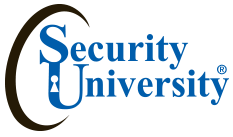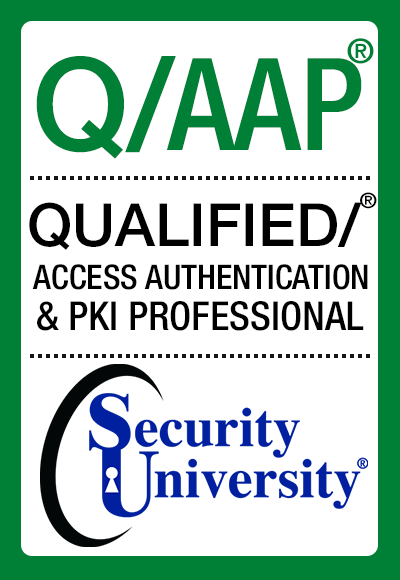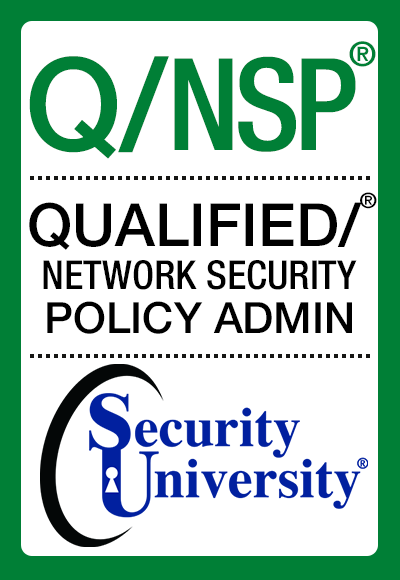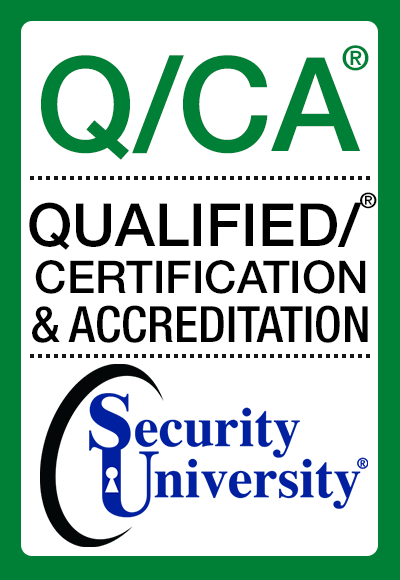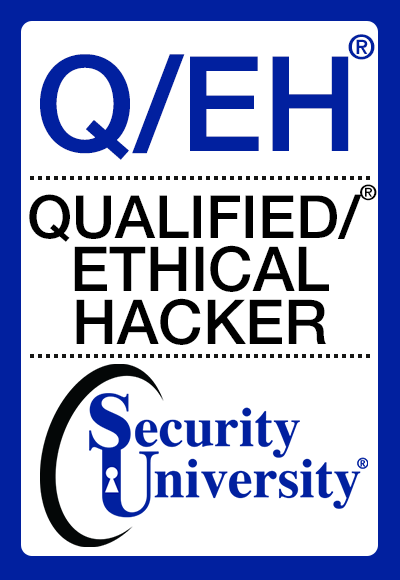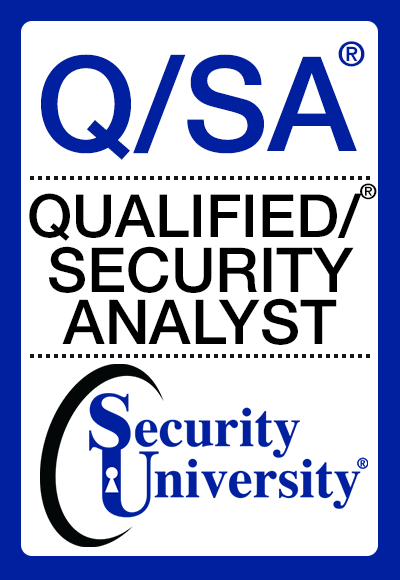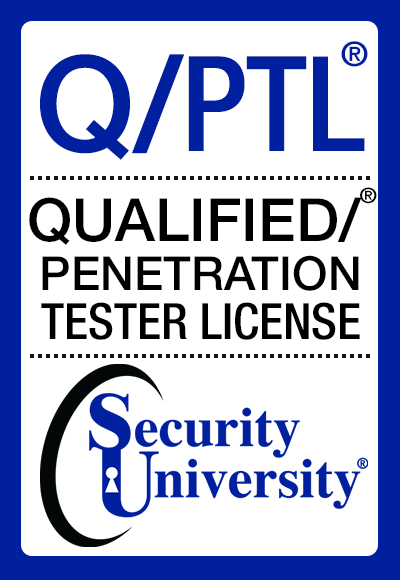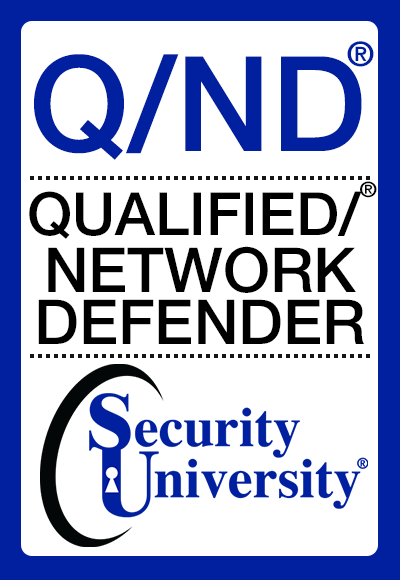Class fee includes all Required classed – exams are required to graduate.
What is a Q/IAP "Qualified" Information Assurance Professional Certificate?
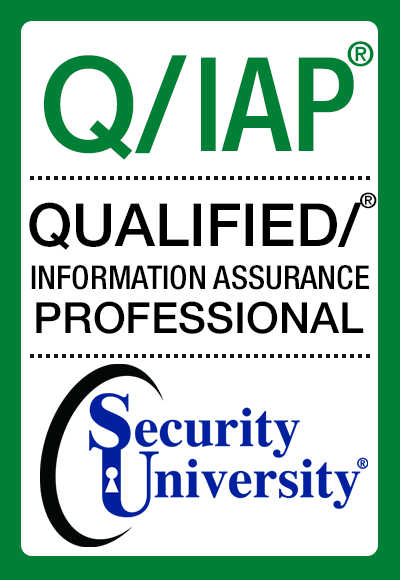 A Q/IAP is person who has passed the SU Qualified Access, Authentication and PKI, Security Policy and SOA, and RMF C&A exams with a 70% or better. SU classes have extreme hands on labs to ensure you gain the necessary knowledge to be "qualified" for your job and ahead of the hackers!
A Q/IAP is person who has passed the SU Qualified Access, Authentication and PKI, Security Policy and SOA, and RMF C&A exams with a 70% or better. SU classes have extreme hands on labs to ensure you gain the necessary knowledge to be "qualified" for your job and ahead of the hackers!
The Q/IAP classes are for IT security professionals, Sys Admins, Security Auditors, Network Auditors, CISO's, all IT personnel and who are looking to build tactical security skills and improve their career and income.
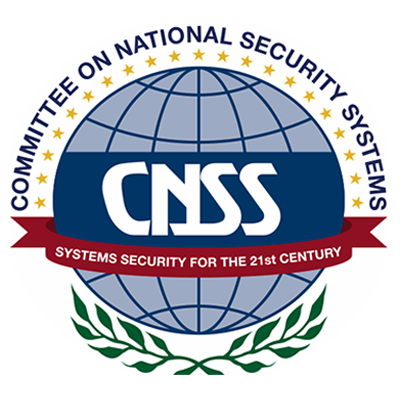
All classes are instructor led by highly qualified SU subject matter experts (SME's) packed with hours of hands-on labs, leading edge tools and technologies setting the stage for your Qualified/ Information Assurance Professional Qualification Exam. After you have mastered these classes and exams you can sit for the Q/IAP exam.
In order to use a Qualified Q/IAP Mastery Level Trustmark the Q/IAP has validated their mastery level hands-on cybersecurity skills by completing the SU Q/IAP® Certificate Program of Mastery and related micro badges (Q/IAP, Q/AAP, Q/NSP, Q/SOA, Q/CA) identify and certify "qualified persons" who subscribe to a rigorous requirement for maintaining their knowledge and proficiency with validated security skills and hands-on practical security experience for information mission assurance.
*A bundle includes all the requisite classes of the Certificate of Mastery Program.
CISSP® is a registered trademark of (ISC)2® -SU CISSP Training classes are not endorsed or sponsored by (ISC)2® /CEH® CHFI® are EC Council registered trademarks SU CWNA / CWSP classes are not endorsed or sponsored by CWNP® /SU CIPP® Training classes are not endorsed or sponsored by IAPP® /R is a required E is an elective *Exams not included, Practica required CPoM designation “validation” after class completion. Practicals are mastery evidence to support the claim of knowing something.
SU Accelerated Qualified/ Registered Cyber Apprenticeship Program. 100% eligible for GI Bill. Earn 8 Cyber Certs/ 24 mo/ attend 8 weeks of hands-on classes/ Employer agreement and Apprenticeship agreement required for apprenticeship program. Advance your cyber career skills at SU. SU Testing (SUT) owns Q/ISP® ,, Q/IAP®, Q/WP®, Q/SSE® , Q/CND® Certificate Program of Mastery Exams/ SUT Q/ISP®, Q/IAP®, Q/WP®, Q/SSE®, Q/CND® Certification exams by TESTRAC are high stakes, on site, on-line, on-demand testing.
- Qualified Access, Authentication & PKI Professional
- Qualified Security Policy Admin & (SOA) Security Oriented Architect
- Qualified Security Certification and Accreditation Process
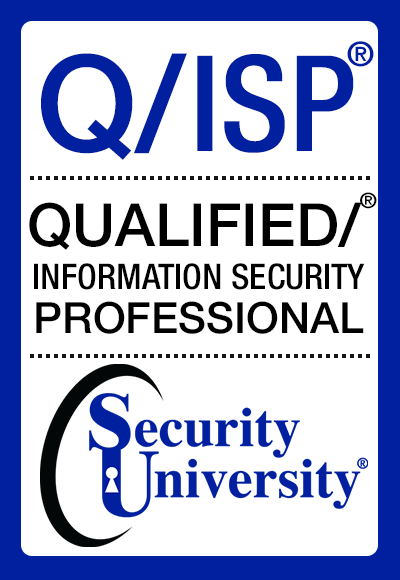 What is a Q/ISP "Qualified" Information Security Professional?
What is a Q/ISP "Qualified" Information Security Professional?
Q/EH, Q/SA- Q/PTL, QEP and Q/ND™ exams qualifies you for the Q/ISP Certificate Program of Mastery. A QISP is person who has passed the Security University Q/EH, Q/SA- Q/PTL Q/FE and Q/ND exams with a 75 or better and completed 3 the Q/PTL, Q/FE & Q/ND practicals. Not all classes are created equal.
SU classes have extreme hands on labs to ensure you gain the necessary knowledge to be "qualified" for your job and ahead of the hackers! The Q/ISP classes are for IT security professionals, Sys Admins, Security Auditors, Network Auditors, CISO's, all IT personnel and who are looking to build tactical security skills and improve their career and income.
All SU Q/ISP classes are instructor led by highly qualified SU mastery level subject matter experts (SME's) packed with hours of hands-on labs, leading edge tools and technologies setting the stage for your Qualified Information Security Professional Qualification Exam. After you have mastered these classes and completed the practicals you can qualify for the QISP credential and Mastery Level designation.
Q/ISP Qualified/ Information Security Professional
1. ECSA™ / Q/SA Qualified/ Security Analyst & Penetration Testing Methods
2. LPT™ / Q/PTL Qualified/ Penetration Tester License
3. CEH™ / Q/EH Qualified/ Ethical Hacker & Network Defender
4. Q/ND Qualified/ Network defender
5. CHFI™ / Q/FE Qualified/ Forensics Expert
